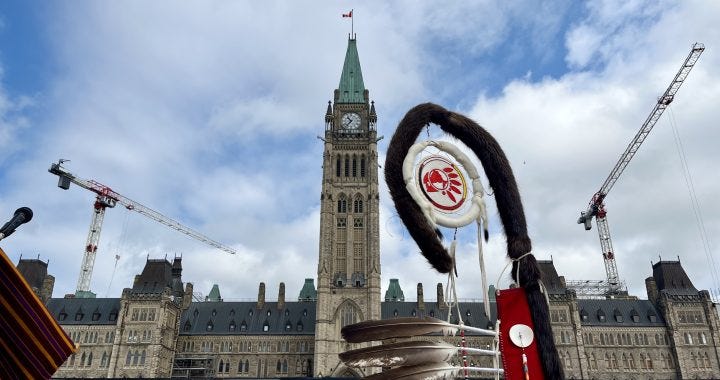Good morning, it’s Friday, November 21st. In today’s news, Realtors are now pitching illegal immigration fraud as success stories, PBO says Liberal deficit plan has a 7% chance of succeeding, The infantilization of Indigenous culture has become a shield for corruption, Health Canada pauses plan to remove labels on cloned meat after public outcry, and much more.
First time reading the daily blend? Sign up here.
The Canadian Dream: Realtors Are Now Pitching Illegal Immigration Fraud as Success Stories
We all grew up hearing about the American Dream—that old story about arriving with nothing, working hard, and building a life. Whether or not that dream still exists is its own debate. But at least the American Dream was anchored in something real: productivity, sweat, sacrifice.
Now contrast that with the new pitch for the Canadian Dream, as told by a Toronto realtor on TikTok who proudly recounted the story of an “Indian couple … illegally living in Canada for 22 years.” No status. “No work permit, nothing legal.” Yet somehow, she beams, “they own three properties worth $2.5 million.”
How? She quotes them directly: “We used our cousin’s name.”
The couple worked under the table, paid cash, hid from immigration, collected rent “for 22 years,” and bought multiple homes by funnelling the deals through a relative with legal status. After two decades of dodging the system, they finally got permanent residency—at which point they began “transferring everything into their name.”
The realtor frames this as a feel-good immigrant success story. A celebration. A teaching moment. Her takeaway message?
“If people like this can own a home in Canada, what’s stopping you?”
This isn’t the story of an overlooked worker who made it through grit. It’s a blueprint for systemic exploitation—of immigration rules, of the tax system, of Canada’s already-distorted housing market. And instead of condemning the fraud, industry professionals are openly using it as marketing content, as if Canada is now a place where you should break the rules long enough to be rewarded for it.
This is what the “Canadian Dream” has become: illegality as a wealth-building strategy, packaged and sold by realtors who stand to profit from it.
And it says something darker about the country. When people can live here illegally for 22 years, earn cash income, buy multiple homes through straw owners, and eventually get PR status without consequence, it’s impossible to argue that Canada has a functioning immigration system—or a serious housing policy.
Meanwhile, the people following the rules, paying taxes, fighting to afford a single home, are being played for fools.
The Canadian Dream used to be about building a life. Now, at least according to TikTok realtors, it’s about defrauding the system—and being applauded for it. Source.
PBO Torches Liberal Budget: Deficit Plan Has a 7% Chance of Succeeding
Canada’s Parliamentary Budget Officer is warning that the Liberal government’s fiscal roadmap is built on accounting optimism rather than achievable targets, casting serious doubt on Prime Minister Mark Carney’s ability to meet the central promises laid out in Budget 2025. In a new review, the PBO says the government is unlikely to meet its own fiscal anchors, including a return to balance on day-to-day spending by 2028–29, and argues that Ottawa’s definition of “capital investment” is so broad that it inflates the government’s long-term fiscal outlook.
Interim PBO Jason Jacques delivered the blunt assessment in a detailed breakdown of the budget’s numbers, making it clear the math does not support the political messaging. According to the report, the likelihood that Canada’s deficit-to-GDP ratio will decline every year from 2026–27 through 2029–30 is just 7.5 percent, a finding that directly contradicts the government’s projection of a smooth, downward fiscal path. Jacques notes that even moderate economic turbulence would push the deficit higher and leave Ottawa less able to respond to future shocks.
A major point of contention is the government’s use of “capital” spending to justify higher deficits. The Liberals argue they are borrowing for long-term nation-building projects, but the PBO says the category has been stretched far beyond globally accepted standards. When the PBO applies a strict, internationally recognized definition of capital investment, total spending in that category between 2024–25 and 2029–30 falls by $94 billion, from the government’s claimed figure down to $217.3 billion. Under this corrected definition, the budget cannot achieve its stated goal of balancing operating spending within the next four years.
The PBO also highlights what is actually driving Canada’s deepening deficits: day-to-day operating spending. Jacques identifies roughly $87 billion in new operating expenditures over five years, combined with significant provisions for contingent liabilities, including environmental obligations, tax non-compliance, and ongoing court disputes, as the real source of fiscal strain. The watchdog warns that the government’s structural budget pressures are simply being masked behind capital classifications that inflate the perception of long-term investment.
To address the growing disconnect between political messaging and fiscal reality, Jacques recommends the creation of an independent expert body to define and enforce capital accounting standards. Without clearer rules, he argues, governments will continue to shift routine expenses into the capital column to hit their self-imposed targets.
Jacques stresses that Canada’s elevated debt level leaves little margin for error. A future recession, financial shock, or global disruption could severely limit Ottawa’s ability to respond—precisely because so much spending is locked into ongoing operations rather than targeted, time-limited investments.
In short, while the Liberal government presents Budget 2025 as a responsible, forward-looking plan, the PBO’s independent review shows a fiscal framework that is fragile, overly optimistic, and increasingly dependent on creative categorization i.e. lying to the public. Canada may not be heading into a crisis today, but the warning is clear: fiscal credibility is eroding, and the margin for future mistakes is shrinking.
The Infantilization of Indigenous Culture Has Become a Shield for Corruption
Canada has built an entire political industry on the romanticization—and now the infantilization—of Indigenous culture. We’re told Indigenous communities exist outside the flaws of human nature, frozen in moral perfection until Europeans arrived. This myth is repeated so often that questioning it is treated as heresy. But it has become a convenient shield that excuses failure, blocks accountability, and funnels billions of tax dollars into black holes of corruption with nothing to show for it.
In no serious country would it be normal for governments to pour staggering sums into reserves, year after year, while families still live in mould-ridden homes and boil water on stoves because local leaders can’t keep a treatment plant functioning. Meanwhile, many of the chiefs and administrators who preside over these communities live in comfort and drive luxury SUVs. No auditor dares push too hard. No politician dares ask where the money went. It’s easier to keep repeating the same script: blame Canada, cut a cheque, and hope the crisis stays out of the news cycle.
The infantilization goes beyond budgets. Look at Richmond, B.C., where private property is now being seized by the state because a tribe fished there centuries ago. This isn’t reconciliation; it’s rewriting the rules of property on politicized historic claims. And it raises a basic question: if Indigenous reserves are self-governing—and they are—how can Canadians be blamed for the conditions inside them? Either these communities govern themselves, or they don’t. If they do, they hold responsibility along with authority. You can’t have it both ways: total autonomy with zero accountability.
But our political class insists on having it both ways because the current model keeps everyone else quiet and keeps the money flowing.
And here’s the part the myth can’t absorb:
The uncomfortable truth is that many Indigenous communities, like all human communities, struggled with violence, hierarchy, and exploitation. Rates of sexual assault on reserves are roughly three times higher than the national average—an issue the romantic narrative has no room for. Pre-colonial tribes often raided one another, kidnapped women, and took them as slaves. These weren’t aberrations. They were part of life in a world where borders and groups formed naturally and force often followed.
This isn’t a moral indictment of Indigenous people. It’s an acknowledgment that they were human. And that is the point: humans everywhere share the same nature—the same capacity for cruelty.
What’s changed is not the past, but our relationship to it. Many now cling to a vision of what they wish the world had been, then judge the world that actually existed through that imagined ideal. It’s a way to feel morally elevated without confronting harder truths about ourselves. It also erases the real histories of Indigenous peoples by replacing them with a storybook version crafted to soothe modern guilt.
If we want reconciliation to mean anything, we need to grow out of this. Respect begins with truth, not myth. Infantilization doesn’t honour anyone. It only blinds us to the very nature we all share.
Health Canada Pauses Plan to Remove Labels on Cloned Meat After Public Outcry
Health Canada has indefinitely paused its plan to eliminate mandatory labelling for foods derived from cloned cattle and swine, after significant public backlash. The agency had proposed removing cloned beef and pork from the “novel food” category—meaning no pre-market safety reviews or mandatory disclosure—arguing the science shows cloned animals are “as safe as” traditionally bred livestock.
But after widespread objections from consumers and advocacy groups concerned about transparency and oversight, the government hit pause. Health Canada says no cloned animal foods are currently approved for sale in Canada, and that the pause is meant to allow “further discussions,” though it offered no timeline or details. Critics, including CBAN and food policy expert Sylvain Charlebois, say the rush to weaken oversight undermines public trust and could set a dangerous precedent for future food technologies like gene-edited products. More
Trump Suggests Death Penalty for Democrats Who Called for US Troops to Defy ‘Illegal Orders’
President Trump has sharply attacked six Democratic lawmakers who released a video urging US service members and intelligence personnel to refuse “illegal orders,” calling their actions seditious and suggesting severe punishment, including death. The lawmakers—Sens. Elissa Slotkin and Mark Kelly, and Reps. Jason Crow, Chrissy Houlahan, Chris Deluzio, and Maggie Goodlander—have military or intelligence backgrounds and emphasized that the oath to defend the Constitution takes precedence over loyalty to any single leader.
Trump posted on Truth Social that their rhetoric is “dangerous to our country” and warned of possible arrests. His allies, including Stephen Miller, accused the Democrats of inciting rebellion and undermining civilian control of the military. The White House insists Trump does not want the lawmakers executed, but describes their message as a threat to the chain of command and military stability.
What’s next: The Justice Department has indicated it will review the video, though there’s no indication of formal charges. Meanwhile, the controversy is likely to escalate politically, with potential hearings, media scrutiny, and continued public debate over military obedience, the chain of command, and limits of political speech regarding national security. More
EU Unveils €100 Billion Military Schengen Zone Plan by 2027 - The plan will require EU states to approve cross-border military movements within three days in peacetime and six hours in emergencies, down from current waits of up to 45 days. More
Court Deciding Whether Alberta Independence Group Can Hold a Referendum - More
Trump Signs Law Requiring DOJ to Release Epstein Files Within 30 Days - More
Mossad Reports Uncover Alleged Hamas Network Planning Coordinated Attacks in Europe - More
Ukraine’s Receives Draft Peace Plan from US - According to reports, the US plan includes ceding land to Russia. More
Federal Judge Orders Trump Admin to End Deployment of National Guard in DC - More
Poland Deploys 10,000 Troops and Closes the Russian Consulate After Rail Blast Blamed on Moscow - More
Elon Musk Predicts a Future Where Robots End Poverty and Work Becomes Optional
Elon Musk predicts that in 10–20 years from now work will become optional, and poverty will become eradicated. He predicts that widespread automation through AI and robotics—like Tesla’s Optimus robots—will drive productivity so high that humans could meet their needs without traditional jobs. Musk suggests money could become irrelevant, echoing ideas from Iain M. Banks’ post-scarcity Culture series, and proposes a form of universal basic income to sustain people in a world where work isn’t necessary.
While economists see full automation as plausible, they question Musk’s timeline and warn that political, economic, and social structures will need major adaptation. In this future, humans may need to redefine purpose and meaning in life as AI and robots take on most labour, leaving society to explore how to stay engaged and fulfilled. More
US Banks Shelve $20 Billion Bailout Plan for Argentina - Bankers are instead discussing a smaller, short-term facility to help Argentina make a roughly $4 billion debt payment in January. More
Verizon is Cutting More than 13,000 Jobs as it Works to ‘Reorient’ the Entire Company
Moon-Forming Impactor Theia Likely Earth’s Ancient Neighbor, New Study Finds
New research indicates that the moon-forming impactor, Theia, may have originated in the inner solar system, making it an ancient neighbor of Earth rather than a distant wanderer. Scientists analyzed isotopes of iron, chromium, molybdenum, and zirconium from 15 Earth rock samples and six moon rocks collected by Apollo astronauts, comparing them to meteorite compositions. The study found that Theia likely shared similar building blocks with Earth, suggesting a nearby origin. The analysis also points to unique material in Theia’s makeup, not seen in known meteorites, providing clues about its size, composition, and the timing of its collision that created the moon. More
Study Reveals That Wild Chimps Consume a Surprising Amount of Alcohol Every Day - The findings suggest that the animals could ingest the equivalent of more than two standard alcoholic drinks per day through their fruit-based diet. More
NASA Finally Releases New 3I/ATLAS Images and Addresses Alien Rumours: ’3I/ATLAS is a Comet’ - More
The Music Industry is Going All In on AI
Two years after “BBL Drizzy” shocked the music world with Drake-like vocals, the major labels have shifted from lawsuits to actively shaping the AI music landscape. Startups like Klay are now signing deals with all three major labels to create licensed AI remixes, promising to compensate artists while using a streaming-style micropayment model. Warner Records calls Klay a way for fans to remix music ethically, highlighting the industry’s push to monetize AI rather than block it.
Labels are also developing AI detection tools, creating licensing frameworks, and negotiating revenue-sharing agreements, signaling they want full control over the AI ecosystem. Even settlements with Udio and Warner show the industry is looking beyond litigation to profit from AI-generated music. Meanwhile, TikTok and streaming platforms are rolling out rules for AI tracks and vocal impersonations, cementing AI’s role in the mainstream music experience. The industry is clearly going all in: AI is becoming a core part of music, as long as the labels get paid. More
Netflix, Comcast and Paramount Submit Bids to Buy Warner Bros. Discovery - More
Lakers Guard (and LeBron’s son) Bronny James Heading Back Down to the G League to Play for South Bay Lakers - More
Five People Have Died at Disney World Over the Past Month - Apparently none of the deaths were a result of accidents or theme park safety issues
Man Wins ‘Lying Flat’ Contest by Laying on a Matress for 33 Hours Straight
On This Day in 1937, Australian endurance athlete Tom Morris set a jump rope world record—skipping rope 22,806 times in a single session



















A criminal is a criminal is a criminal!!! :(
I work primarily with FN governments. Your points are correct. Even once one realizes this there is still space for treating them like humans (not say you were inferring they are not).
I frequently meditate on what a realistic solution is. Sadly, nothing comes.